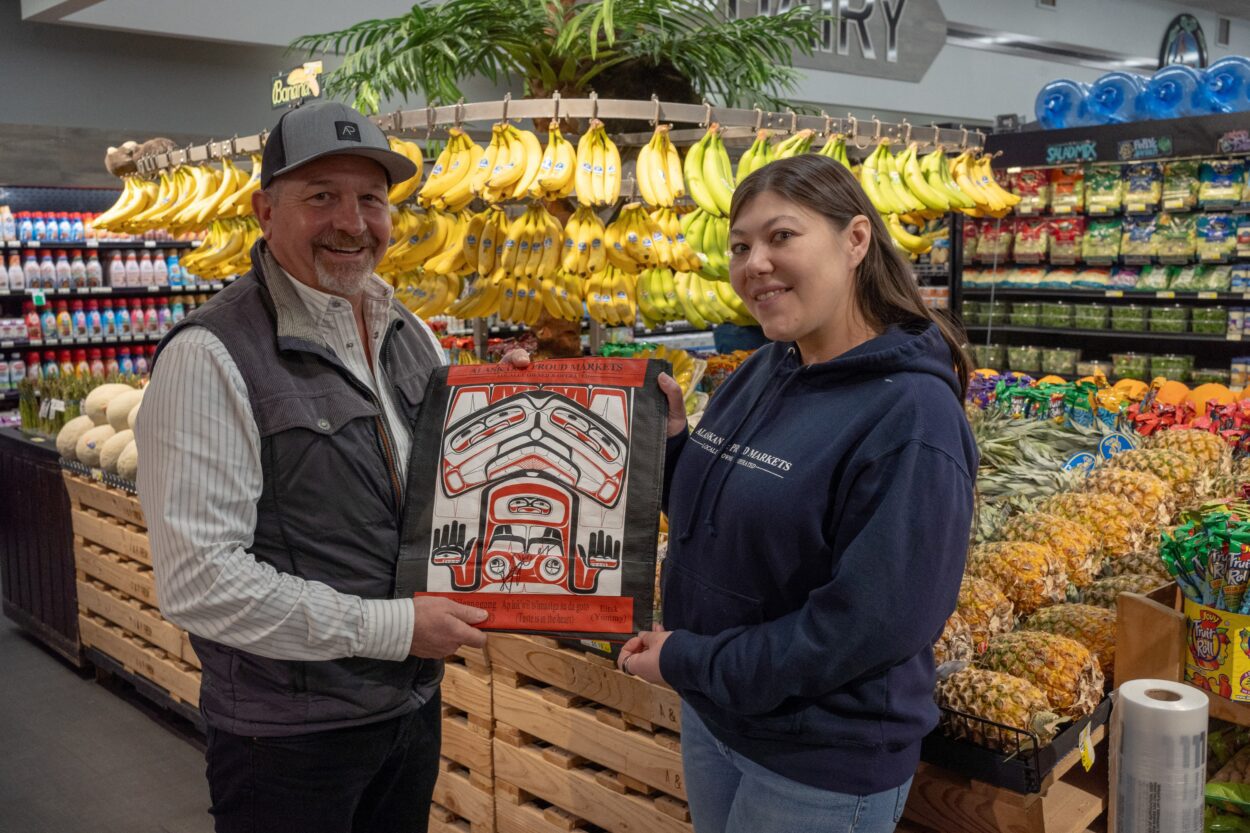
Communities across the country are trying to cut down on plastic. For some, they’ve nixed plastic grocery bags. In a place as wet and rainy as Ketchikan though, plastic bags are still as popular as ever. One grocery store collaborated with local artists and culture bearers to create a reusable option that is uniquely Southeast Alaskan.
K’ujgad kilganggang.
It’s a X̱aat Kíl phrase meaning “taste is important.” Michelle Eakman, the office manager of the grocery store Alaskan & Proud in Ketchikan and a Haida interpreter, is reading it off of a reusable grocery bag that she helped create.
“There’s a lot that does not translate today,” Eakman says of X̱aat Kíl, the language of the Haida people. “You know, we didn’t have those words back then. There is a large group that is working on translating current phrases and words.”
The original phrase she was going for was “taste matters,” but there’s no direct translation. So she worked with local Haida elder Delores Churchill, one of the only living native X̱aat Kíl speaker in the world, to come up with the phrase.
Lingít and Tsimshian Sm’álgyax phrases expressing similar sentiments are all over the bag as well.
“They say that people who know who they are lower risk of any kind of abuse, whether that be substance – they’ve actually done studies that prove that when people know their language, that actually connects them so closely with their culture and heritage, that it brings them to another level to where they feel more comfortable and confident,” says Eakman, adding that if people see more of these languages in their daily lives – who knows? Maybe they’ll want to take a class.
Alaskan & Proud, or A&P, the grocery store that made the bags has two locations in Ketchikan and one in Thorne Bay on Prince of Wales Island. Ben Williams is the franchise’s owner. He says he sold his engineering firm in Oregon and took over for his father, Ben Williams Sr., in 2016. He says 100% of the proceeds from the bags will go to high school sports programs in Ketchikan, Metlakatla, Thorne Bay, Klawock, Craig and Hydaburg.
“Part of the goal is to reduce plastic,” says Williams. “It’s raining outside. It’s Alaska. You can’t use paper bags, they would fall apart. So plastic bags are always going to be a part of transferring goods.”
The other problem Williams contemplated is a relatable one. Well-meaning people buy reusable grocery bags and then forget them at home.
“But if we can create what I’m hopeful for are nicer, reusable bags or ones that people are more proud of, people will remember to take into the stores. I am hoping that we can reduce the plastic consumption in this area,” the grocery store owner said.
To create the bag’s design, Williams turned to the Ketchikan Area Arts and Humanities Council who referred him to Kevin Clevenger, a local artist and Tsimshian carver.
Clevenger says when he heard the proceeds for the bags were going to local high school sports programs, he was on board. He based the bags’ design on a bentwood box, the deftly carved and crafted cedar storage boxes traditionally used by the tribes of the Northwest Coast.
“We stored everything in bentwood boxes, everything from storage of food, like salmon, everything from food to our regalia. And so I thought it was fitting to do a bentwood box design,” said Clevenger.
What he came up with was an intricate design of a human form in the traditional red, black, and white and also features an allusion to a familiar figure for Haida and Tsimshian.
“It’s a real abstract design of a figure in our culture called mousewoman,” Clevenger explained. “Mousewoman is an elderly wise woman that helps people with advice.”
A&P says that if all goes as planned, total proceeds from the bags should total $25,000.
Get in touch with the author at jack@krbd.org.





